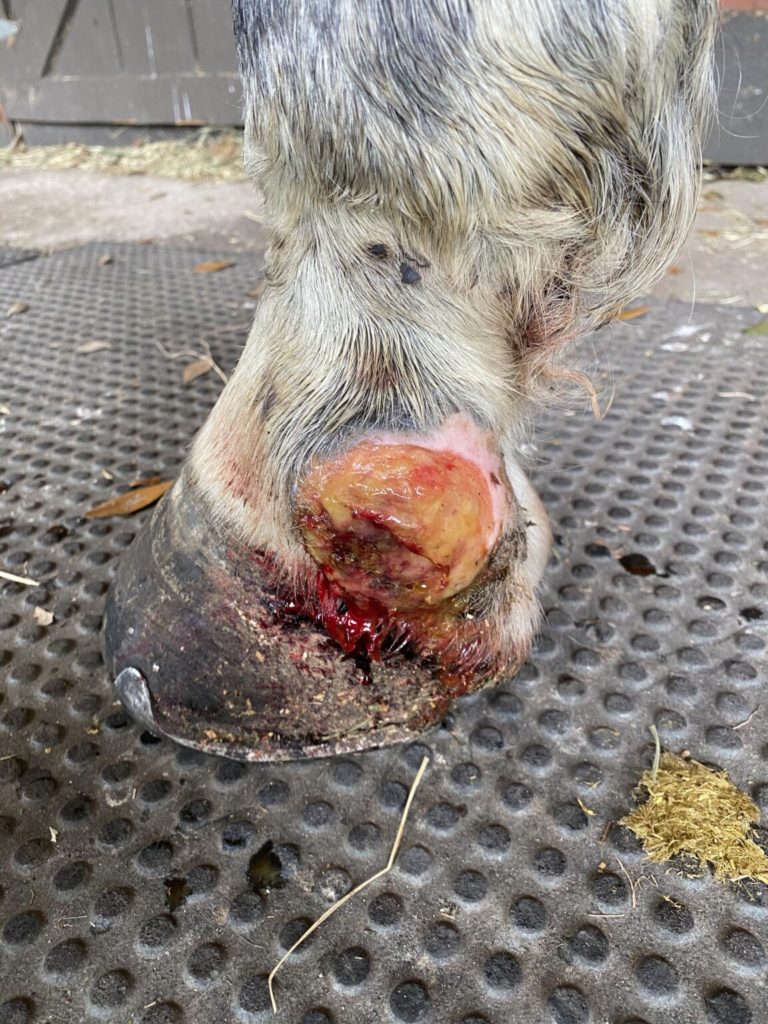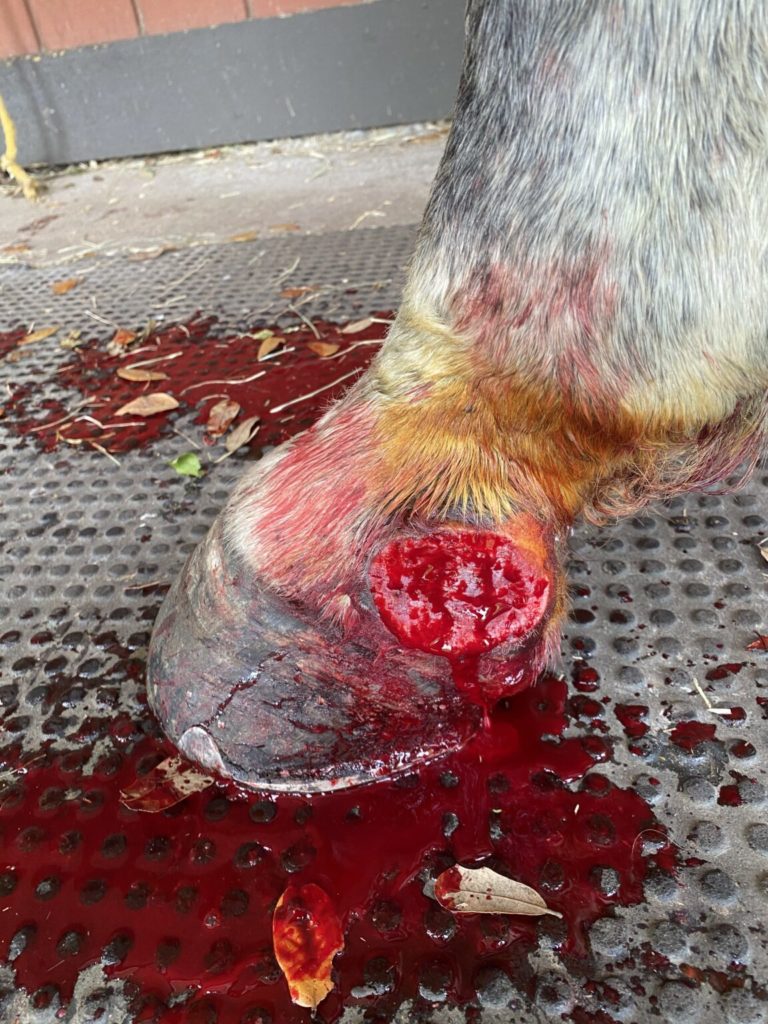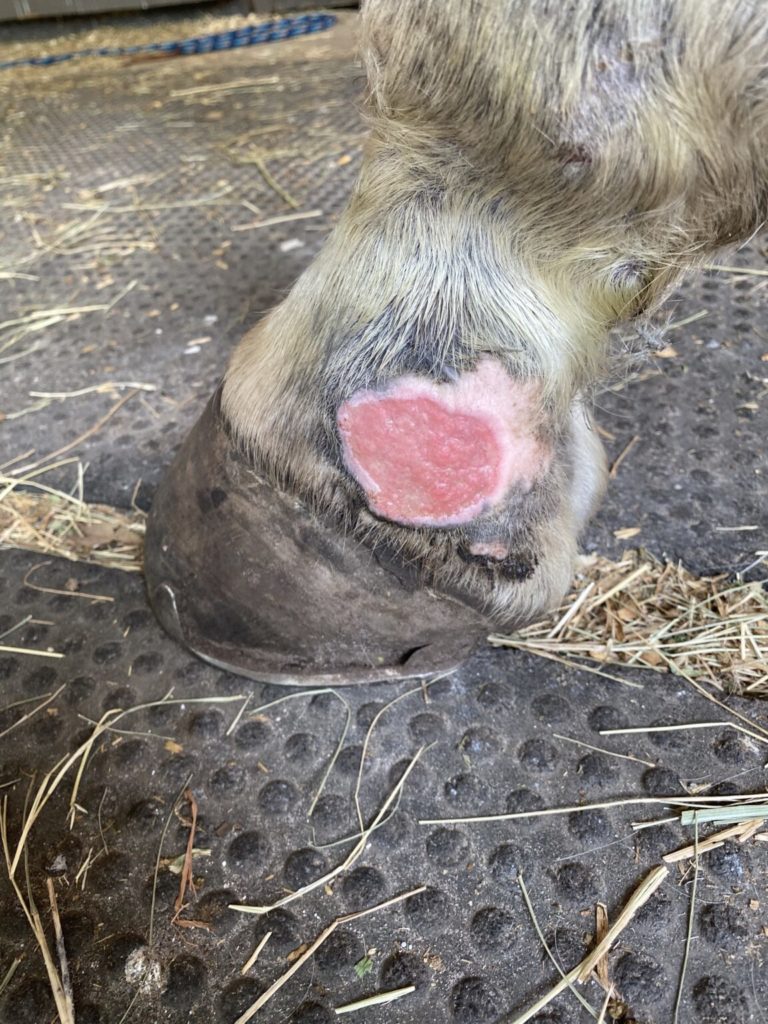It’s summer, and this season is particularly hot and humid. With those conditions often come summer sores. Beth Lawler of Palm Beach Equine Clinic shares tips on managing summer sores, along with treatment. Please note: Graphic images below. Words by Beth Lawler.
Healthcare Reminder
Summer heat is in full force across the states, and with high temperatures and humid conditions comes an elevated risk for equine summer sores. Flies thrive in these conditions which can create many nagging problems for horses. One of the most serious problems are equine summer sores, which are medically known as habronemiasis, granular dermatitis, and jack sores.
Summer sores are an unfortunate yet common occurrence in areas with warmer climates, and a problem that Palm Beach Equine Clinic veterinarian Dr. Meredith Hustler treats often. According to Dr. Hustler, prevention is key, but proper and prompt treatment is paramount if a summer sore does emerge.
UNDERSTANDING SUMMER SORES
Summer sores are lesions on the skin caused by the larvae of equine stomach worms Habronema. These worms in the horse’s stomach produce eggs that pass through the digestive tract and are shed in the horse’s feces. Barn flies typically gather around manure and ultimately collect the parasite’s larvae on their extremities. Summer sores will occur when flies carrying the larvae deposit their eggs onto an open wound or the mucous membranes of a horse. This typically includes areas such as the prepuce, lower abdomen, corners of the eyes, and margins of the lips. The larvae cause an inflammatory reaction, often with discharge and the production of granulation tissue infected with larvae.
“The proud flesh that can appear as a summer sore is a product of the irritation and hypersensitive reaction from the larvae,” said Dr. Hustler. “Once a summer sore is properly diagnosed, the end goal of treatment is to kill both the adult larvae and the flies themselves.”
Signs that a Horse may be Suffering from Summer Sores
- Non-healing skin lesions
- Intense itching
- Formation of exuberant granulation tissue (proud flesh)
- Calcified necrosis (dead tissue)
DETECTION & PREVENTION
“Firstly, it is incredibly important that the owner does not assume a lesion is a summer sore because of its appearance or their experience with summer sores,” said Dr. Hustler. “Granulation tissue can look like a summer sore but actually be the result of a different infection or skin issue. So, it is crucial to contact a veterinarian at the first sign of a potential summer sore before any treatment is administered.”
Commonly, a summer sore is the visible granulation of tissue containing small yellow, rice-like larvae within the skin and a mucopurulent (mucus or pus-like) discharge associated with the wound. Prevention is the most effective way of controlling summer sore outbreaks. The best way to protect horses is to implement effective methods for:
- Fly control with automatic fly control systems, fly masks, sheets, boots, and a sheath protector.
- Proper manure removal of two to three times per day.
- Appropriate wound care using topicals such as a silver nitrate stick (when not bleeding) and bandages to keep wounds protected from flies.
- Implementing an effective de-worming program (Quest+, Power Pack Ivermectin, or Dectomax treatment).
 Photo by Sheri Hooley/Unsplash/CC.
Photo by Sheri Hooley/Unsplash/CC.
A diligent de-worming program is the most important element of prevention because effective de-wormer disrupts the parasite’s life cycle internally. The key is to kill both adult worms in the stomach and the larvae that form in the skin tissue.
Many owners also chose to plan ahead by supplementing their horse’s diet with immune boosting natural supplements. “Sometimes with patients that have stagnant, non-healing summer sores, they can really benefit from being prescribed herbal medicines. I’ve seen many horse’s do well on the Chinese Herb Wei Qi Booster in particular,” Dr. Hustler remarked.
TREATING SUMMER SORES
For treatment of the summer sore itself, corticosteroids are administered to reduce the inflammatory hypersensitivity reaction. Antimicrobials are administered to treat any secondary infection that may develop as the result of the open wound. If not treated quickly and appropriately by a veterinarian, summer sores can persist for months and possibly require a costly surgical procedure to remove the granulated tissue and larvae.
“The standard summer sore treatment is debridement of the wound and an injection of Ivermectin (Noromectin),” continued Dr. Hustler. “However, more medicine is not more effective with summer sores. The larvae and flies can develop a resistance to the treatment. So, it is always best to consult with your veterinarian for dosage information. Also, this particular treatment does not include preservatives. Therefore, it is imperative that an unopened bottle is always used to prevent contamination that could lead to an abscess in the injection site.”
 A severe summer sore case before debridement. Photo by Palm Beach Equine Clinic.
A severe summer sore case before debridement. Photo by Palm Beach Equine Clinic.
 A veterinarian must debride the exuberant granulation tissue so that healthy tissue can grow. Photo by Palm Beach Equine Clinic.
A veterinarian must debride the exuberant granulation tissue so that healthy tissue can grow. Photo by Palm Beach Equine Clinic.
 Healthy tissue forming post-summer sore debridement. Photo by Palm Beach Equine Clinic.
Healthy tissue forming post-summer sore debridement. Photo by Palm Beach Equine Clinic.
Additionally, there are local injections that can be administered directly around or into the lesion itself to promote healing. Dr. Hustler also relies on oral treatments, such as Prednisolone and Dexamethasone tablets, depending on the patient’s case.
At the first sign of a summer sore, contact your veterinarian to discuss treatment and develop an effective fly-management program for your barn.
